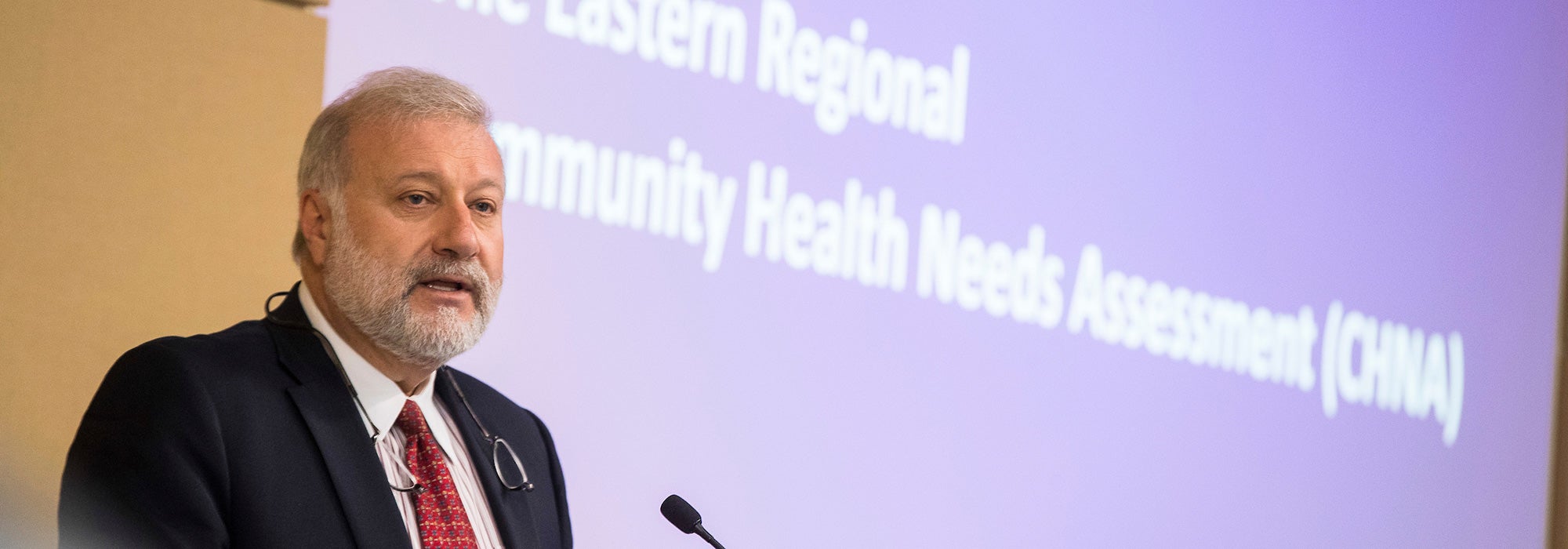BETTER HEALTH DATA, FOR LESS
Large health data collection partnership kicks off
A regional program that will provide not-for-profit hospitals and county health departments in eastern North Carolina with better health data at a lower cost officially kicked off Tuesday.
Approximately 100 officials from 23 hospitals and health departments representing 32 different counties filled the conference room of the Eastern AHEC building in Greenville on Tuesday morning to learn more about their respective roles in the Eastern N.C. Regional Community Health Needs Assessment program.

Will Broughton, coordinator of the Office of Health Access in the Brody School of Medicine at ECU, speaks during a kickoff event for the Eastern N.C. Regional Community Health Needs Assessment program.
The Office of Health Access in the Brody School of Medicine at East Carolina University, working with the Foundation for Health Leadership & Innovation in Cary, secured a $320,000 award from The Duke Endowment last year to help establish the standardized regional program to help streamline both the data collection and reporting aspects of the health needs assessments that hospitals and county health departments are required to conduct.
“This project has all of the elements of servant leadership,” said Kathy Dail, director of the state Division of Public Health’s Community Health Assessment Program, adding the Eastern N.C. Regional CHNA program is bigger than what is already being done in the western portion of the state.
“We’re doing more here in eastern North Carolina and in North Carolina for community health assessment than anywhere in the country or the world. … Nobody can hold a candle to what’s going on here,” Dail said. “We all do better when a big chunk of people do the right thing, and I think that’s where we are.”
Hospitals are currently required by the Internal Revenue Service to conduct these assessments every three years, while the state Division of Public Health requires local health departments to conduct essentially the same assessments every four years. The new program will enable the participating entities to conduct the surveys on the same three-year cycles.
Al Delia, director of Brody’s Office of Health Access, said the program is going to deliver better and more consistent data that will be able to be compared and contrasted across county lines for the first time. Most of the hospitals and counties will also see a significant cost savings by being part of the program, Delia added.
“The real reason we’re doing this is because it will lead to better health interventions to improve health in the region,” Delia said. “It is getting increasingly difficult to secure resources to intervene on health issues in our communities. Doing this as partners makes it infinitely easier to try to secure those resources.”
The kickoff event also served as the announcement of the private company – Conduent Community Health Solutions (formerly the Healthy Communities Institute) – that was awarded the contract to assist with the data collection, analysis and writing of the county-level reports.
The Healthy Communities Institute (HCI) originated at the University of California, Berkeley in 2002 as a provider of web-based tools for community analysis. A year ago, HCI was acquired by Conduent – the world’s largest provider of diversified business services, with 93,000 employees worldwide and approximately $6.5 billion in revenue – as part of its goal of integrating end-to-end health management.
“We are all about community health improvement and that’s all our organization does,” said Scott Dahl, a senior director for Conduent. “So hopefully this is taking data to another level and is about creating change.”

Attendees listen to a presentation during the kickoff event for the Eastern N.C. Regional Community Health Needs Assessment program.
